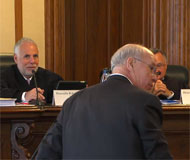11/21/2014
Illinois Supreme Court Punts On Red Light Camera LegalityIllinois Supreme Court gives up without resolving questions over the legitimacy of red light cameras in Chicago.

Red light camera programs have grown so controversial in Illinois that the state Supreme Court could not come to agreement on whether the automated ticketing program in Chicago is legal or not. The justices deadlocked on the case brought by Patrick J. Keating, who argued that the people ticketed in the Windy City before the state legislature authorized the program are entitled to a refund in a class action suit.
"This is an exceedingly rare occurrence in Illinois jurisprudence," Keating told TheNewspaper in an email. "We are disappointed that we did not receive a substantive opinion from the court, but we respect and appreciate the consideration the justices gave to the case. It appears likely that two or three of the remaining justices felt strongly that we had established the illegality of Chicago's program."
Keating argued that Chicago jumped the gun in setting up its photo enforcement program. With the encouragement of what the US Department of Justice says were bribes from Redflex Traffic Systems, Chicago gave the Australian firm the green light in 2003 to begin building what was to become the world's largest municipal red light camera program. The General Assembly did not endorse cameras until three years later.
Keating argued that even this authorization was flawed, as state lawmakers were not universally enthusiastic about having photo ticketing in their jurisdictions. So lawmakers carved up the state, only allowing photo enforcement in Cook, DuPage, Kane, Lake, Madison, McHenry, St. Clair, and Will Counties, excluding the rest. The state constitution says laws must be "general" and not carve out exceptions for particular jurisdictions.
The justices split three against two on the questions that Keating raised, but the court failed to reach enough of a consensus to resolve the dispute definitively.
"In this case, two justices of this court have recused themselves and the remaining members of the court are divided so that it is not possible to secure the constitutionally required concurrence of four judges for a decision," the court announced. "Accordingly, the appeal is dismissed."
As a result, the Court of Appeals decision stands as the final result of the case (view opinion), but this outcome cannot be cited as precedent.
A copy of the one-paragraph opinion is available in a 15k PDF file at the source link below.


